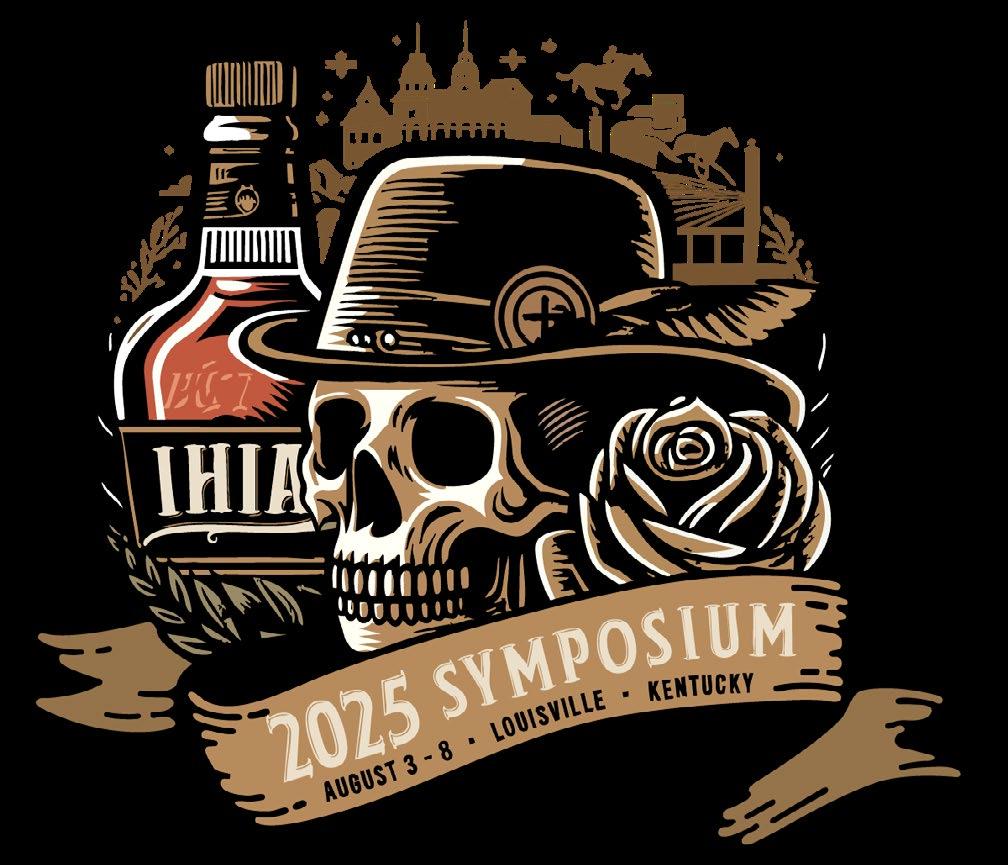

INVESTIGATIVE INVESTIGATIVE QUARTERLY
A Publication by the International Homicide Investigators Association (IHIA)
PRESIDENT’S MESSAGE
Sergeant Rob Peters, Sacramento County Sheriff’s Office

Dear Colleagues, Members and Sponsors, Spring is here, and summer is quickly approaching us. Thus far, building on the momentum of last year, 2025 is turning out to be another exciting year for the International Homicide Investigators Association (IHIA). We have had the opportunity to facilitate and share training, experiences, and best practices with our long-time members, as well as brand-new members. Besides our incredible lineup of training courses, IHIA and the FBI recently had the opportunity to facilitate a Foundational and Advance Homicide Course for the Guam Police Department in Guam, which is located in the Micronesia subregion of the western Pacific Ocean.
We continue to strive to bring training opportunities around the globe.
The agenda for the 2025 Symposium in Louisville, Kentucky, has been completed. As many of our members and sponsors know, we are dedicated to bringing our members exciting case presentations, the latest investigative tools, and developing technologies that could assist our members in their death investigations. The Symposium Planning Committee has created a fabulous training program for Louisville. We look forward to seeing all of our old friends, as well as a lot of new friends, at the symposium.
Please continue to utilize the website, www.ihia.org , for the latest training opportunities, our association sponsors, and our valued exhibitors. The website is also a great tool for locating investigators throughout the United States, Canada, the United Kingdom, Australia, Europe, Asia, and Africa.
On behalf of the Association’s Board, I want to thank you for your membership and continued support. We couldn’t do any of this without you and your continued support. We will continue in our endeavor to provide the best resources, guidance, and training to each of you and our profession.
What’s Inside the IQ:
• Letter from President Rob Peters
• From the desk of the IHIA Executive Director Steve Lewis
• Welcome Our Newest Board Member: FBI Major Case Specialist Kevin Hagan
• Guam Training Event
• IHIA 31st Annual Symposium
• Article: A Three-Decade Journey to Justice: The Roger Dean Homicide Investigation
• Article: “You can get a bit immune to it”: Emotional preparedness and coping strategies.”
• Article: The Vital Importance of Officer-Involved Critical Incident Investigations Training
• Upcoming Training
• Marketing Opportunities

President Rob Peters
International Homicide Investigators Association
www.IHIA.org
™ The IHIA is the world’s largest and fastest growing organization of homicide and death investigation professionals. The non-profit organization represents the largest network of homicide professionals and practitioners ever assembled. The IHIA has representatives in every U.S. state and nations on six continents. For membership information, visit: www.ihia.org/Membership
From the desk of The IHIA EXECUTIVE DIRECTOR Steve Lewis

Dear Members, Partners, and Supporters of the International Homicide Investigators Association,
As we reflect on the first quarter of 2025, I am proud to share the progress and accomplishments achieved by our association. We have continued to pursue excellence in the field of homicide investigation, driven by our collective commitment to justice and the highest standards of professionalism.
ACHIEVEMENTS AND DEVELOPMENTS
During this first quarter, we have seen significant advancements in our training programs. We have already presented numerous courses to nearly 725 members around the world. From our foundational course, advanced course, mass casualty/active shooters and officer involved critical incident courses. These sessions have covered a diverse range of topics, including forensic analysis, victimology, and the latest technological tools available to investigators.
COLLABORATIONS AND PARTNERSHIPS
One of the key highlights of this quarter has been the strengthening of our collaborations with international law enforcement agencies and forensic laboratories. During the month of March, we facilitated two courses to the Guam Police Department and several surrounding nations nearby. These partnerships have facilitated the exchange of valuable information and resources, enabling our members to tackle complex cases with greater efficacy.
LOOKING AHEAD
As we move forward, we remain dedicated to providing our members with the resources and support they need to excel in their crucial roles. Our upcoming events and initiatives promise to offer further opportunities for professional development and networking. We have numerous course offerings for the remainder of 2025 and continue to add events. Don’t forget we have our annual symposium on August 3-9, 2025, in Louisville, Kentucky. We hope to see you there!
CONCLUSION
In conclusion, I extend my heartfelt gratitude to each of you for your dedication and hard work. Your contributions are invaluable to our mission, and together, we will continue to make strides in advancing the field of homicide investigation. Let us embrace the challenges that lie ahead with resilience and determination, knowing that our collective efforts will pave the way for a safer and more just society.
Stay Safe,

Steve Lewis IHIA Executive Director

Welcome Our
Newest
Board Member: FBI Major Case Specialist Kevin Hagan

Kevin Hagan embarked on his illustrious career with the FBI in 2020, serving as a Major Case Specialist within the Behavioral Analysis Unit 4 (BAU-4), a division devoted to violent crimes against adults. Kevin brings a wealth of experience and expertise, having dedicated twenty-five years to law enforcement prior to joining the FBI.
Kevin’s extensive career began with the Baltimore City Police Department, where he served with distinction for twenty-one years. His tenure in the Homicide Section saw him excel in various roles, including detective, sergeant, and lieutenant. In these capacities, he investigated and managed complex cases involving violent crimes, death investigations, and officer-involved shootings, demonstrating unwavering commitment and remarkable skill.
Following his retirement from the Baltimore City Police Department, Kevin transitioned to the Howard County Police Department as a Cold Case Investigator. In this role, he demonstrated relentless dedication in his pursuit of justice, working on unsolved homicides and suspicious missing person cases, bringing hope and resolution to many affected families.
We are thrilled to announce and extend a warm welcome to the newest board member of the International Homicide Investigators Association, FBI Major Case Specialist Kevin Hagan.
Kevin further expanded his expertise at the Maryland Office of the Attorney General, where he investigated allegations of child sexual abuse within the clergy. His efforts spanned the Archdiocese of Baltimore, Washington, DC, and the Diocese of Wilmington, Delaware. His meticulous investigations provided crucial insights and accountability. Beyond his impressive professional achievements, Kevin holds a Bachelor of Arts degree in Criminal Justice from Temple University. He is also certified in Behavioral Analysis through the Federal Law Enforcement Training Accreditation (FLETA) program, underscoring his commitment to continuous learning and excellence in his field.
Kevin Hagan’s exemplary career, marked by his dedication to justice and his profound impact on the communities he has served, makes him a valuable addition to our board. We look forward to his insights, leadership, and contributions as we continue our mission to support and advance the field of homicide investigation.
Please join us in welcoming Kevin Hagan to the International Homicide Investigators Association.
EVENT HIGHLIGHTS: GUAM TRAINING EVENT | Tumon, Guam

The International Homicide Investigators Association (IHIA) was on the island of Guam recently to deliver two weeks of basic and advanced homicide training to law enforcement officers from across the Pacific. About 150 law enforcement professionals were on hand each of the two weeks to enhance their investigative skills, representing agencies from Guam, Palau, American Samoa, Nauru, Saipan, the Federated States of Micronesia, and Kiribati. In addition, United States military police and investigative services from the Marine Corps, Navy, Army, Air Force, and Coast Guard were also in attendance. Participants were welcomed by Guam’s Governor, the Honorable Lourdes ‘Lou’ Leon Guerrero; Lt. Governor, the Honorable Joshua Tenorio; and Guam Chief of Police Stephan Ignacio.
As the largest and fastest growing worldwide professional non-profit organization dedicated to providing training, leadership, resources and networking opportunities to investigators primarily focused on homicide, death, and violent crimes investigations, Guam PD officials said it made sense that they would seek to bring IHIA to the region. And IHIA was excited and grateful for the opportunity to collaborate and bring this important professional investigative training event to fruition.
One local news reporter described it this way: For homicide detectives, every case is a puzzle. Each piece matters, and so does every officer working to solve it. These two weeks of courses are more than just skill-building – they are about collaboration, resilience, and upholding justice. (Joan Aguon Charfauros, KUAM News)
The two weeks consisted of basic homicide investigation training, designed for newer detectives, and advanced homicide and violent crimes training,
focusing on advanced investigative techniques and complex cases like mass killings and serial crimes.
But this was not just about techniques and training. As noted in a program tribute written by one of the local attendees, the entire experience embraced the principle of inafa’maolek - a CHamoru concept that means “making good.” It represents the spirit of harmony, interdependence, and the belief that justice is a shared responsibility. Law enforcement isn’t just a profession, it’s a calling. And officers aren’t just preparing for their next case. They’re committing to a lifelong mission to uphold peace, protect the innocent, and ensure justice prevails.
We are confident that investigators who attended the training will put those lessons learned into practice upon their return to work, more prepared than ever to find truth and justice while serving and protecting their communities in a spirit of unity.
Subject matter experts participating as presenters over the two weeks included Major Case Specialist Tim Keel (FBI retired); Dr. Peter Collins (Ontario Provincial Police, Canada); Detective Victor Diaz (Richardson PD/Dallas FBI VCTF); District Attorney Vern Pierson (El Dorado County, California); Special Agent Scott Eicher (Precision Cellular Analysis, FBI retired); Jessica Koong (Qiagen & IHIA Corporate Council Director); and D/F/Lt. Dave Eddy (IHIA Director of Training, Michigan State Police retired).
The IHIA would like to thank Guam PD Captain Kim Santos, Sergeant Angel Santos, and the entire GPD team who graciously welcomed us, shared of their time, food, and fellowship, and made all of this possible.

Article: A Three-Decade Journey to Justice: The Roger Dean Homicide Investigation -
By Michele Kennedy
On November 21, 1985, shots rang out as residents were preparing for their day in a suburban neighborhood in Lone Tree, Colorado. The Douglas County Sheriff’s Office responded to several 911 calls and found a man bleeding in the street and a woman wearing a bath robe standing over him in the snow. She had tape above her eyes and her wrists were bound. The woman was screaming that they had been robbed and her husband was trying to get away. Her husband also had rope tied around one of his wrists, and he tragically died in the ambulance on the way to the hospital. Five years later the case was still unsolved, and the surviving widow was the target of unsuccessful extortion attempts. Both cases remained unsolved for over three decades until investigative genetic genealogy (IGG) and a tip provided some answers.

A HARROWING CRIME
Fifty-year-old Doris Jean “DJ” Dean was taking a bath just after her 51-year-old husband, Roger, had left for work. She heard Roger calling for her to come out of the bathroom. She put on a robe and came out of the bathroom to discover Roger and a gunman wearing a ski mask. The gunman ordered Roger to tie DJ up on the bed before taking Roger to another bedroom, where she heard them arguing about money. The gunman returned to the bedroom where DJ was tied up, demanding to know how much money they had in their savings account. He left again when he heard Roger break free from his bindings, and she heard a scuffle followed by numerous gunshots. Freeing herself, she ran out of the bedroom and the house to find Roger lying at the end of the driveway, gravely injured. A neighbor that came out to help heard DJ exclaim, “Will it never end”?
Investigators later learned that Roger and DJ were still reeling from the death of their 22-year-old son, Troy, who

had died several years earlier in a trainversus-car accident. Their surviving daughter, Tamara, no longer lived with her parents, but she recounted how the tragedy had left the family shattered. “Will it never end”, may have reflected the culmination of years of heartbreak and struggles.
THE CRIME SCENE AND CONFLICTING WITNESS ACCOUNTS
Investigators processed and photographed the crime scene, discovering a dark brown ski mask in the living room and a backpack in the couple’s bedroom. The backpack contained a knife, several different types of tape, rope, jewelry belonging to the Deans, and cash from Roger’s wallet. Credit cards and other jewelry were staged on top of two nightstands but had not yet been placed in the backpack. In the other bedroom where Roger was tied up, investigators found a pair of Roger’s glasses covered in duct tape and a broken bed post on the floor. It was evident that the gunman had been interrupted and had not intended to leave behind his ski mask and backpack.
Witness accounts were conflicting. DJ believed the gunman was white based on the sound of his voice. Other witnesses reported seeing two males fleeing in a vehicle, while a 9-year-old girl who lived across the street stated that she heard gunshots and saw a Black male struggling with Roger outside the residence. She also saw the suspect flee the scene in a bronze-colored car. Despite these discrepancies, investigators focused on finding a white male suspect based on DJ’s description

Article:
‘You can get a bit immune to it’: Emotional preparedness and coping strategies as utilised by English homicide detectives
ABSTRACT
Despite facing extraordinary emotional demands, limited research has been conducted on homicide investigators in England and Wales. This qualitative study explores the unique challenges experienced, focusing on well-being and coping strategies. Five detective sergeants participated in semi-structured interviews, with results highlighting influences on wellbeing. Both positive and negative themes emerged, including intrinsic motivations, emotional preparedness and operational stress. Discussions around the diverse coping strategies employed by homicide investigators emphasised the importance of developing tailored support programmes to address the multifaceted challenges they face. Expanding on this research, encompassing a larger and more representative sample of homicide investigators, is encouraged for deepening our knowledge and allowing for evidence-based support to be employed for these dedicated professionals.
INTRODUCTION
Homicide investigators are the ones to bear the weight and responsibility of dealing with some of the most heinous crimes. Investigating homicide falls under the department of Major Crimes (Innes, 2012), which encompasses various offences, including but not limited to: missing persons, where it is believed they have been murdered; rapes, where the suspect is unknown; and suspicious deaths. Investigators dedicate substantial time to meticulous data collection, compiling detailed reports, analysing evidence and conducting multiples rounds of interviews (Van Patten and Burke, 2001). Beyond the procedural aspect, confronting graphic scenes and navigating the emotional trauma of victims’ families and witnesses presents significant psychological challenges. Investigators operate in an environment heavily charged with human tragedy, demanding remarkable resilience and emotionally intelligent interactions. Although the general public might perceive police work, homicide in particular, as ‘glamorous and exciting’, Huey and Broll (2015) suggest that individuals in the line of work do not.
Research examining the effects of well-being on homicide investigators remains notably scarce. Within this limited body of research, the focus often revolves around comparing the impact of child and adult homicides (Roach et al., 2017). Despite the comparative nature, understanding the well-being of homicide investigators as a whole remains relevant, because it ultimately pertains to their primary duties in handling homicide cases. The job demands–resources (JD-R) model (Bakker and Demerouti, 2007), and the conservation of resources (COR) theory (Hobfoll, 1989) provide complementary perspectives that can be applied to the understanding of the well-being of homicide investigators via a holistic approach. The JD-R model suggests that high job demands, such as exposure to trauma, deplete personal resources and can lead to burnout. However, suitable job resources, such as colleague support, can be a buffer to the negative effects. The COR theory suggests that individuals aim to protect and preserve their own resources. For the investigators, personal resources are at risk, causing negative impacts to occur when these are threatened, requiring coping strategies to conserve, or if needed, replenish them.
Operational stress is a key factor impacting the wellbeing of homicide investigators. Lazarus and Folkman’s (1984) transactional model of stress and coping defines operational stress as a complex interaction between the individual and their environment, in which the demands of the situation are perceived to exceed said individuals available coping resources, thus jeopardising their well-being. For homicide investigators, operational stress is almost inevitable because of the nature of their work; exposure to traumatic events – both first- and second-hand, handling graphic crime scenes, as well as the rooted pressure to solve the complex cases (Cronje and Vilakazi, 2020).
Article: The Vital Importance of Officer-Involved Critical Incident Investigations Training
- by Paul
Officer-involved critical incident investigations are among the most scrutinized and consequential incidents in law enforcement. These events demand a meticulous, transparent, and professional investigation. The stakes are extraordinarily high: public trust, officer accountability, and community safety hang in the balance. Meeting these challenges requires comprehensive training in investigating these incidents. Such training is not merely a procedural necessity—it is a cornerstone of modern policing that ensures justice, preserves legitimacy, and fosters healing in the aftermath of these complex events.
WHY TRAINING MATTERS
The immediate aftermath of an officer-involved critical incident is often chaotic and emotionally charged. A poorly handled investigation can damage public trust, inflame tensions, and harm agency morale. Training equips agencies with the tools to manage these volatile situations effectively, ensuring evidence is preserved, witnesses are interviewed properly, and the rights of all parties are respected.
Investigations into officer-involved shooting/use of force incidents are distinct from other criminal investigations. They require a delicate balance: accountability for all involved while recognizing the split-second decisions inherent in the use of force. Without specialized training, investigators may lack the expertise to investigate use-offorce incidents objectively, leading to biased outcomes— either overly lenient or unfairly punitive. Well-trained personnel can precisely assess body camera footage, physical evidence, and witness statements, developing the complete fact pattern surrounding an incident.
KEY COMPONENTS OF EFFECTIVE TRAINING
1. Scene Management and Evidence Preservation
Training must emphasize securing the scene, maintaining the chain of custody for evidence, and avoiding contamination. Officers need to understand their roles—as involved parties, witnesses, or responders—and refrain from actions that could compromise the process, such as discussing the incident prematurely with colleagues.
2. Use-of-Force Standards and Legal Frameworks
Investigators must be well-versed in federal and state
Belli,
IHIA Immediate Past President
laws governing police use of force. Training should include scenario-based exercises that simulate realworld situations that help officers and investigators understand the legal and ethical boundaries of force application.
3. Effective Interviews
Witnesses to an OIS—whether civilians or fellow officers—may find the experience affects their recollection. Training in interviewing techniques can improve the accuracy of statements and reduce the risk of misinterpretation or coercion.
4. Transparency and Communication
Public perception of an OIS often hinges on how agencies communicate with the community. Training should include strategies for releasing timely, accurate information without jeopardizing the investigation.
5. Independent and Impartial Investigation Protocols
Training programs should help investigators understand their role as independent factfinders. Doing so should foster objectivity and reinforce public trust.
THE CONSEQUENCES OF INADEQUATE TRAINING
When police agencies neglect training, the fallout can be devastating. Ineffective investigations may lead to wrongful exonerations or unjust prosecutions, leaving communities feeling betrayed and officers demoralized. Conversely, agencies that invest in training and implement robust OIS protocols see improved outcomes in accountability and reduced litigation.
BUILDING A CULTURE OF ACCOUNTABILITY AND TRUST
Beyond technical skills, officer-involved critical incident investigation training cultivates a culture of objective and complete investigations. It signals to officers and the public that the investigation will be thorough and complete. This dual commitment is essential in an era where law enforcement faces unprecedented scrutiny, amplified by the proliferation of cellphone videos and social media.
READ FULL ARTICLE HERE















UPCOMING REGIONAL TRAINING OPPORTUNITIES


Advanced Homicide/Violent Crimes

Officer Involved Critical Incident Investigations Course

Topics
• The need for best practices in increasingly more sophisticated investigations into OIS/In-Custody Deaths.
• The investigation: Addressing stakeholder concerns through comprehensive responsibilities of the investigator.
• Patrol Response to officer involved Force/Death Investigation.
• Criminal and administrative investigation bifurcation issues. The latest in officer and witness rights, preventing civil liability exposure to the investigator.
• Avoiding bias in the investigation.
• Meeting the standards of proof and elements of lawful force.
• Applied forensic human factors.
• Critically understanding and analyzing video evidence.
• Conducting effective interviews of involved officer(s).



•

and Infant Death



• Scenario based training course. Easy to follow guide to bring the scenario back to your agency.
Who Should Attend
• This course provides valuable information for law enforcement officers regardless of assignment. Critical for officers assigned as Criminal investigators, Administrative Investigators, Patrol/detective supervisors and Managers, and Public Information Officers. This is a highly interactive course and is limited to 30 attendees.
• Each course has two instructors creating a optimal student to instructor ratio. Your instructors are highly experienced homicide investigators with over 20 years of experience in conducting and training officer involved force investigations, homicide of peace officer investigations, firearms, and use of force and a nationally recognized use of force expert/consultant attorney representing peace officers, who possesses over 25 years of law enforcement and training experience.

Forensic Investigative Genetic Genealogy Workshops
(with demonstration and hands-on training)
Topics
• The origin of FIGG and foundational understanding of how to go from unknown crime scene DNA to identity resolution using FIGG
• DNA 101 for detectives (contextualized for FIGG): What is a SNP?
• Learning case criteria, database terms of service, legal and policy considerations
• Understanding differences between what public vs. private labs may be able to offer, and making the right choice based on needs, funding, and agency policy
• Using genealogy databases, understanding match lists, and determining the best way-forward for family tree building
• Surreptitious collection considerations: methods, affidavits, warrants, and more
• Case studies: what to expect, anticipating challenges, and lessons learned in investigations
• Engaging prosecution and discussion around discovery issues and trial prep
• Identifying funding and building an in-house FIGG unit
• Hands-on genealogy research demonstration and walk-through (must have a profile in a law enforcement friendly genealogy database)
ADDITIONAL UPCOMING 2025 REGIONAL TRAINING OPPORTUNITIES
MARCH 31
OFFICER INVOLVED CRITICAL INCIDENT INVESTIGATIONS COURSE (Stuart, FL)
APRIL 15
IRONCLAD COURTROOM TESTIMONY FOR LAW ENFORCEMENT (Kalamazoo, MI)
MAY 5
DNA SUMMIT (Pompano Beach, FL)
MAY 5
UNRAVELING MYSTERIE S: ADVANCED COLD CASE TRAINING (Columbus, OH)
MAY 12
COLD CASE/NO-BODY HOMICIDE INVESTIGATION & PROSECUTION COURSE (Grand Prairie, TX)
JUNE 2
CHILD & INFANT DEATH INVESTIGATIONS COURSE (Greenville, SC)
JUNE 24
OFFICER INVOLVED CRITICAL INCIDENT INVESTIGATIONS COURSE (Grand Rapids, MI)
JULY 14
FOUNDATIONAL HOMICIDE INVESTIGATIONS COURSE (Spokane, WA)
JULY 23
OFFICER INVOLVED CRITICAL INCIDENT INVESTIGATIONS COURSE (Dunedin, FL)
AUGUST 3
2025 IHIA 31ST ANNUAL TRAINING SYMPOSIUM (Louisville, KY)
SEPTEMBER 8
ADVANCED HOMICIDE & VIOLENT CRIMES INVESTIGATIONS COURSE (Boston, MA)
OCTOBER 20
FOUNDATIONAL HOMICIDE INVESTIGATIONS COURSE (Missoula, MT)
NOVEMBER 3
COLD CASE INVESTIGATIONS: STRATEGIES & NEW TECHNOLOGIES SUMMIT (Salt Lake City, UT)
LEARN MORE ABOUT TRAINING OPPORTUNITIES HERE
REGIONAL MARKETING OPPORTUNITIES
As a company investing time and resources to the Law Enforcement Homicide Investigator’s field, you have an opportunity as an exhibitor or sponsor to visit with these investigators to enhance your relationship with each individual and their departments. Enhance your company’s exposure and your relationship with these investigators and their departments at one of these new events. Please contact Steve Lewis slewis@ihia.org or 540-898-7898.
SPONSORSHIP RECEPTION $2,000
($2000 exclusive, sponsorship will be shared with non-competing companies if exclusive is not secured.)
SPONSORED COFFEE OR SPONSORED BREAKFAST $500 each day
SPONSOR DAY $500 each day
Be the exclusive sponsor of a specific day at this event. You may come in meet with the attendees, mingle, accompany them to Lunch and so on. A few minutes will be provided to introduce yourself to the attendees and pass out information.
Investigative Quarterly Newsletter Ads
The IHIA e-Newsletter is e-mailed to over 10,000 readers quarterly. The e-Newsletter is placed on the IHIA website for members. Advertising spaces are available to those companies wanting to reach the IHIA membership and are available in each issue.
Trim Size: 519 wide x 200 high (in pixels) Static Only Rates: $350 • Premium Position #1 $300 •
